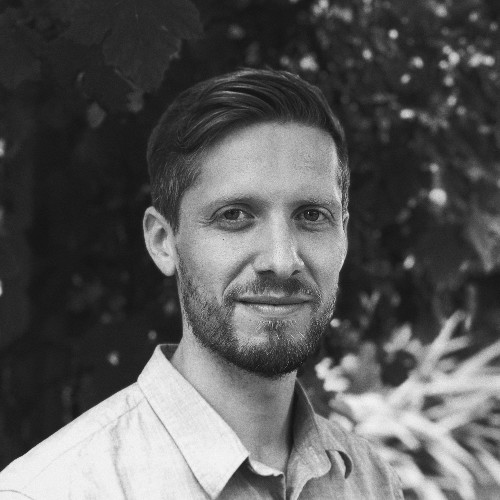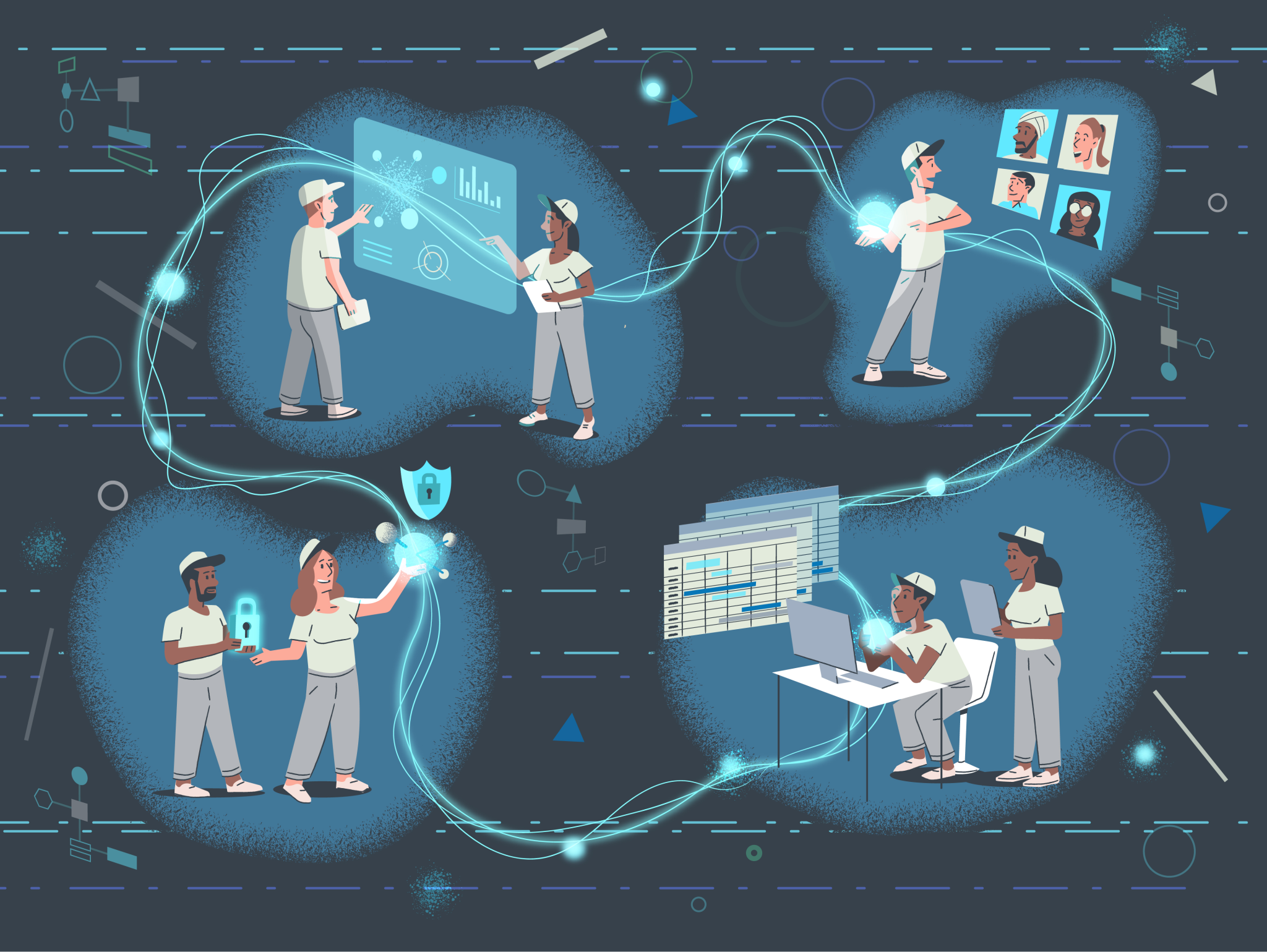Overview
The Trustworthy and Ethical Assurance Platform (TEA Platform) is an open-source tool developed by researchers at The Alan Turing Institute and the University of York. It is designed to support the development and communication of trustworthy and ethical assurance cases, particularly in the context of digital healthcare. The TEA Platform aims to provide practitioners, developers, legislators, and policymakers with the means to audit and assess the ethical implications of AI systems effectively.
What they needed
The TEA project team, led by The Alan Turing Institute, are developing a methodology for creating assurance cases that communicate ethical practices for Artificial Intelligence (AI) systems. Additionally, a functional prototype to support the documentation of ethical claims has been developed.
The Alan Turing Institute sought to understand potential users' perceptions of its methodology, and they identified the need for improvements in user experience (UX) of their current prototype.
What we did for them
In response to the TEA project's needs, we conducted research that included a collaborative workshop and a usability study. The aim was to understand the motivations and barriers to implementing ethical initiatives in AI systems and to improve the platform's usability for documenting these initiatives for policymakers and internal reviews.
Fruto aggregated the research into a user journey map, this method identified opportunities to address user needs, translating into tangible changes for the TEA Platform. Fruto organised these features and changes into a user story map, enabling Fruto and The Alan Turing Institute team to prioritise iterations according to budget requirements and business needs.
The next phase involved implementing these changes by creating low-fidelity wireframes. This supported discussions and allowed for iterations before developing a new UI direction with a pattern library to support the design's scalability as the tool evolves.
Discovery workshop
We facilitated an interactive workshop with participants who had experience with AI systems. The aim of the workshop was to gather insights into their challenges and requirements for implementing ethical practices. We also gathered their thoughts on the TEA methodology for documenting ethical practices. During the workshop, participants expressed the need for clarity on ethical principles, guidance, and accountability when implementing ethical initiatives. They highlighted confusion in interpreting ethical principles into their workflow and concerns about the risk of oversight. Additionally, discussions revealed the importance of involving various stakeholders, including senior leaders, project managers, and regulators, in ensuring adherence to AI ethical principles. The workshop identified core user needs which were used to create features and functionality for the MVP and further inform Alan Turing's research for their next phase.
Usability testing
Usability testing sessions were conducted to gather first-hand feedback on existing usability issues and inform the MVP redesign process. Through these interactions, users expressed frustrations with the platform's lack of clarity and guidance, emphasising the need for improved support and educational content. Usability testing also uncovered specific challenges users faced while navigating the platform, providing valuable insights for prioritising design improvements.
User journey mapping
The workshop and usability testing surfaced multiple challenges, a user journey map helped organise and visualise the process of implementing an ethical initiative for an AI system. By mapping out user interactions within the platform, we gained a deeper understanding of user behaviours, needs, pain points and contextual insights. The user journey mapping process revealed opportunities to improve interactivity, streamline navigation, and add features to enhance the overall user experience for The Alan Turing Institute team. This technique helped communicate our findings concisely and encourage discussion around potential solutions.
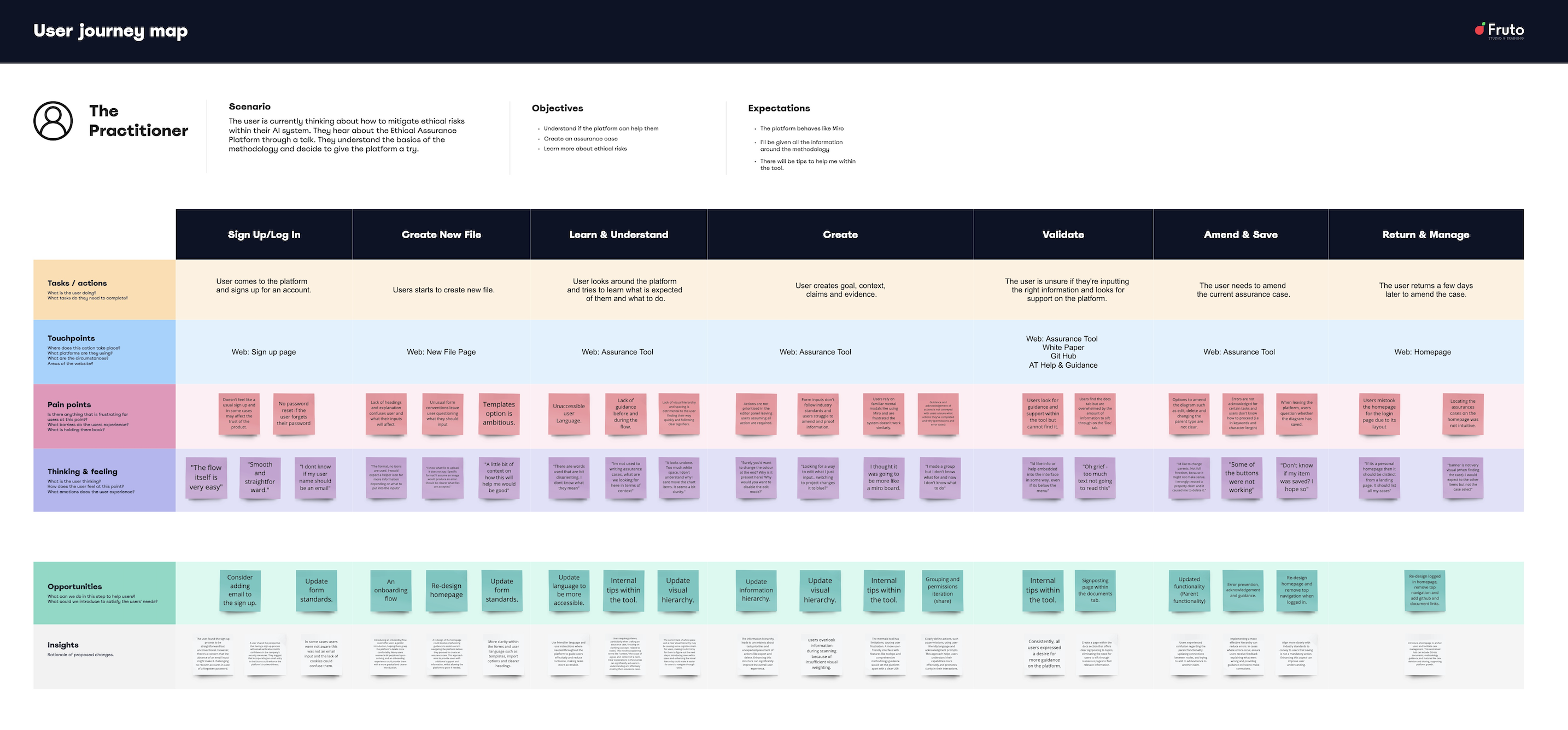
User journey map
User story mapping
Based on insights from the user journey map, we identified core use cases that responded to user needs. These use cases were integrated into a user story map, a technique used to prioritise features and plan the implementation phase in a way that keeps the end-to-end user experience coherent. This strategic prioritisation helped streamline the initial build phase for Alan Turing and clarified which features to design and develop in subsequent phases.
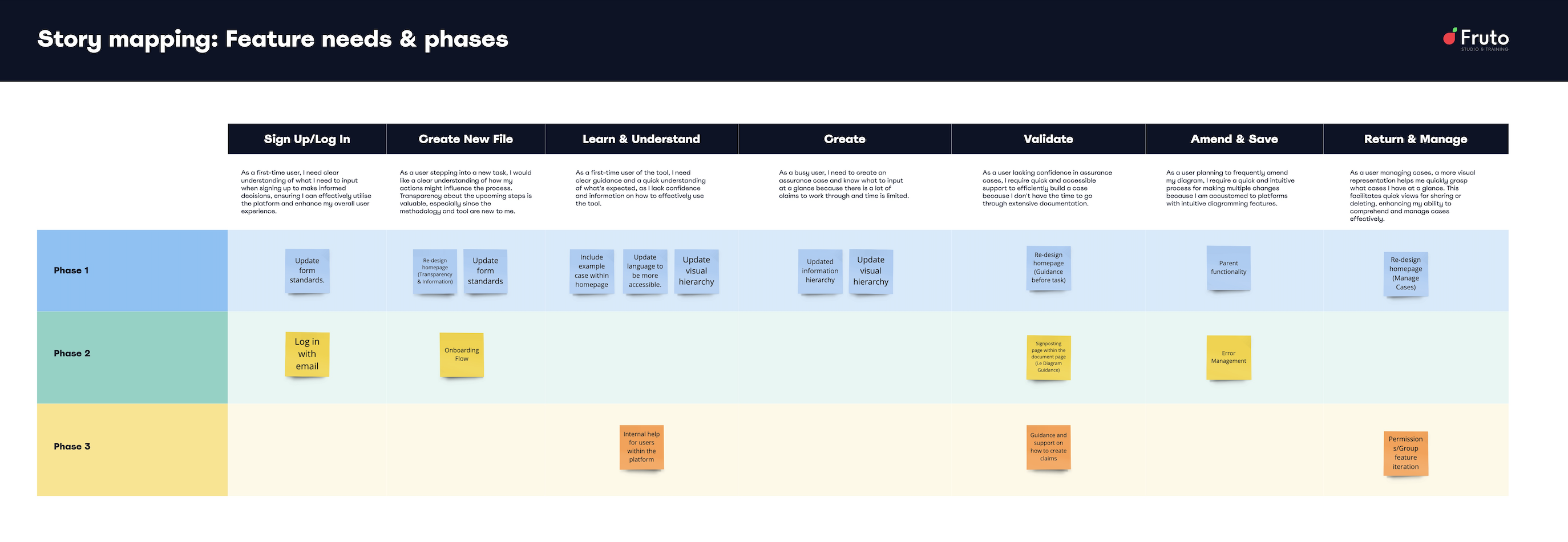
Story mapping: Feature needs & phases
Wireframing & Information Architecture
Based on the updates to the platform, we created a new information architecture to support the new flows. Low-fidelity wireframes were then created to help communicate new changes to the platform and review with The Alan Turing Institute before investing in further UI designs. As a team, Fruto and The Alan Turing Institute discussed and iterated on the design concepts before finalising and moving on to the UI design phase.
UI Design and Pattern Library
We created a modern UI design that adhered to usability conventions and prioritised visual clarity, simplicity, and accessibility. Leveraging insights from user research and usability testing, we developed a design language that aligned with the platform's goals and user expectations.
Additionally, we established a pattern library to ensure consistency across the platform and facilitate future feature development. This approach enabled us to deliver a cohesive user experience while accommodating diverse user needs and preferences.
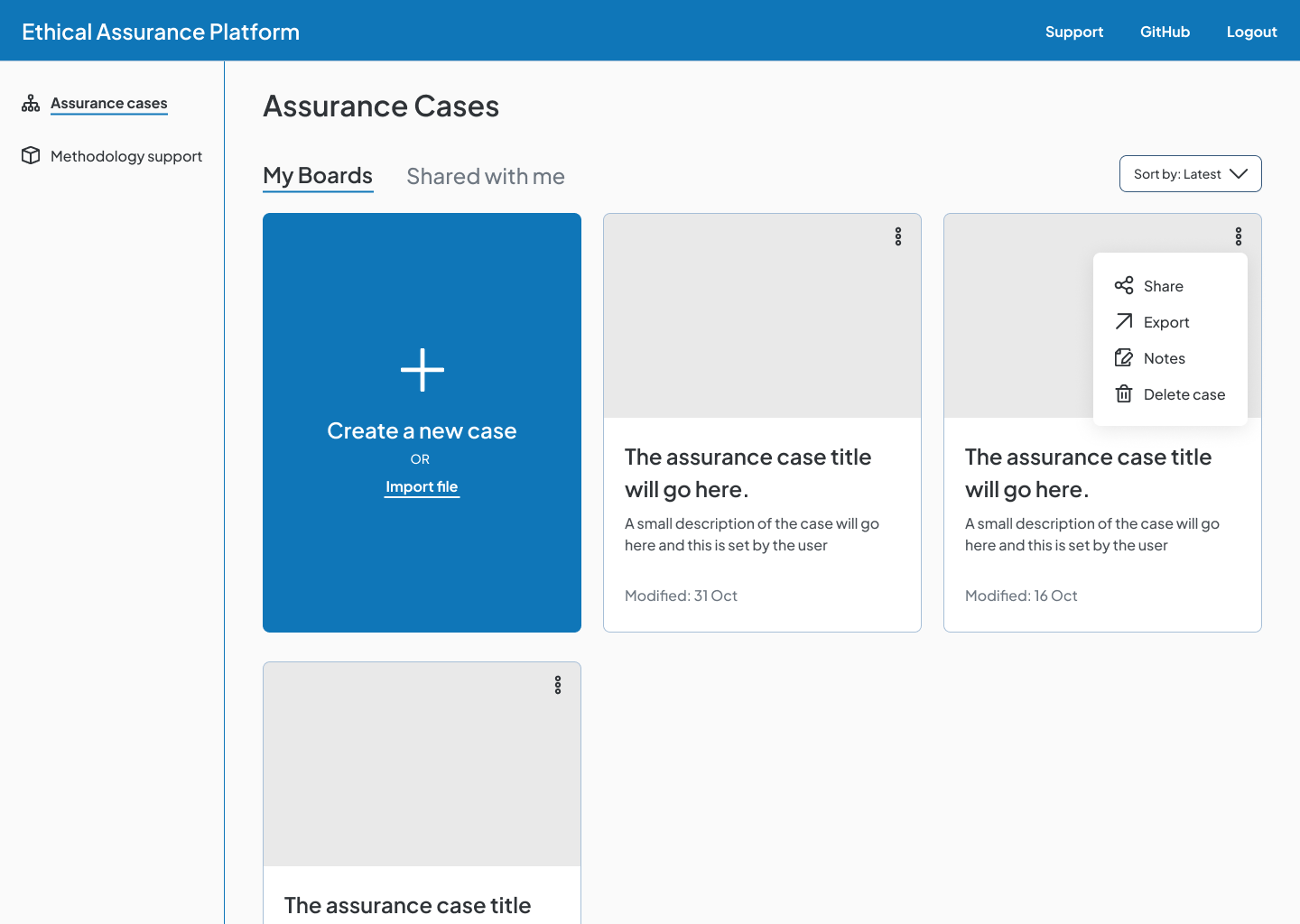
Homepage
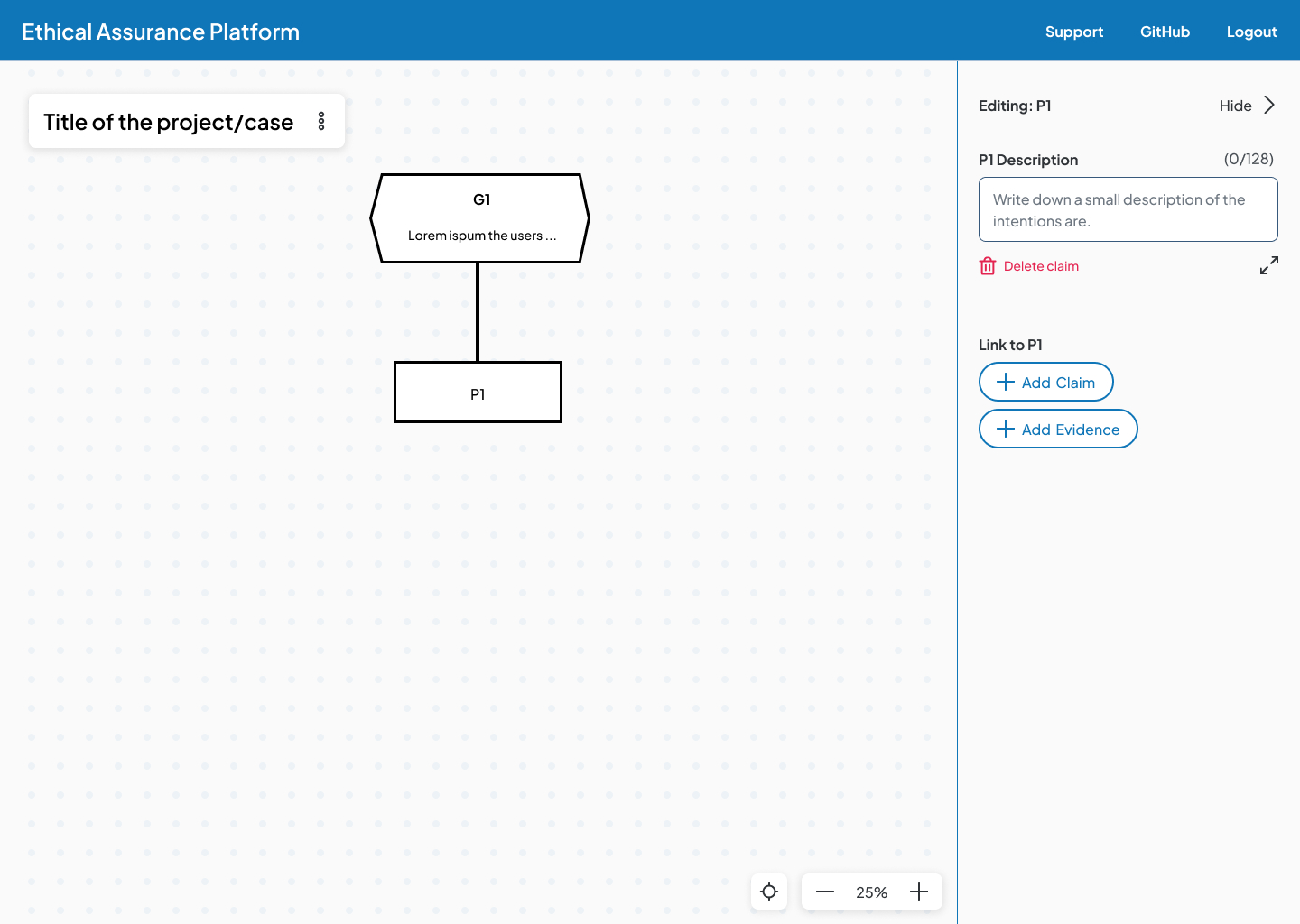
Case editor page
Results
Through collaborative efforts and iterative design improvements, we addressed the usability concerns and surfaced users' contextual needs to support the development of the MVP. The redesigned TEA Platform now offers enhanced usability, clearer signposting, and guidance on ethical principles. The project outcomes demonstrate the value of user-centred design principles and the importance of collaboration between researchers, practitioners, and developers in addressing complex ethical challenges in AI.
I have had the pleasure to work with Fruto on multiple occasions, and they have always brought a high level of professionalism, creativity, and expertise to the projects. In this instance, the workshops, usability testing, and wireframing that Fruto conducted has allowed us to evolve the TEA platform into a significantly more usable and accessible tool, which has enhanced our users’ ability to engage with the research project. I would highly recommend Fruto to any research or development team.

